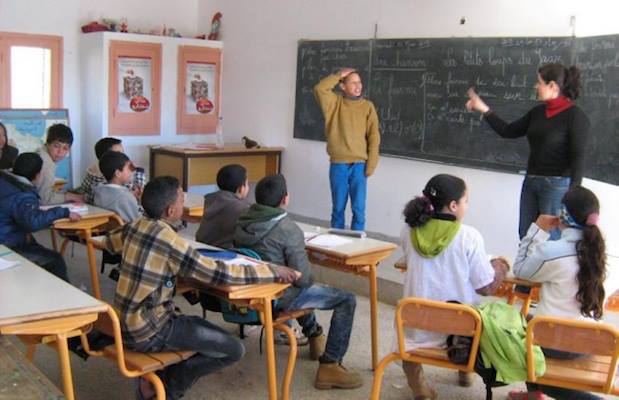Laayoune, Morocco
As Soren Kierkegaard states “How absurd men are? They never use the liberties they have. They demand those they do not have. They have freedom of thought; they demand freedom of speech.” When we outflank around, we realize that freedom of thought is the only thing we still have in this enraging world, and, then, we call upon that it will never be taken from us. I believe that we are all free and that one way to clearly express our freedom is by thinking, and these are my thoughts about our intimidating reality.
I, again, write for the sake of further elaboration on the issue of education in Morocco. It is, though, worth noting that along the lines, several examples that voice teachers’ concerns, doubts and fears will be comprised. These examples are the direct result of several discussions that have been undertaken earlier with so many of them. Therefore, such examples are relatively true and merely reflect their genuine experience and perceptions.
As it has already been aforesaid, the mistaken belief that the government fosters with respect to the contractual policy in Morocco is distinctly noticed in statements such as “some teachers are ineffective…some are not doing an adequate job or working as hard as they should”. Therefore, contracts will render the coveted prospect. It is very true that a system of accountability will be needed to encourage teachers to assume more responsibility towards their duty. Yet, it should meanwhile be able to guarantee their constancy and social stability.
Throughout the very long history of education, debates and discussions have never excluded the role of teachers. It is pivotal to be au fait that teachers exert a positive influence on learners and the community at large through transferring values of a high and incorporeal nature. However, and to be fair-minded, there are minorities that discourage this very task. A system of evaluation is, therefore, required to monitor teachers’ work. For that matter, I never dare to suggest as there are specialists in the domain, but I can share some of the reflective ideas that can ultimately promote a reasonable system of accountability. The first is intensifying the number of agencies authorized to take charge of monitoring teachers’ work. The second is establishing short and long-term standards to achieve within a specified time. The third is establishing professional work communities that model and monitor the progress of teachers. The task of such communities is to inspire teachers and foster their skills through continuous professional development. For a flash, one may think this is ideal, but it is very feasible everywhere, and in Morocco is no exception.
Unfortunately, there is a spectrum of considerations that have firmly fueled the disinterest in the current contractual decision. All of them sprang from an obvious mistreatment and disrespect that some teacher contractees experienced at work by a colleague, a head master, a director, or a student. I truly disclaim the generalization of these incidents. Yet, it is very true, and there is an array of examples that support this statement. To begin with the recent issue that has hugely quaked Facebook, in particular, a teacher in Ouarzazate has been victimized by one single decision without any severance pay. A deadly report, which is supported by very weak arguments about his disqualification and mistreatment to learners, has been fully taken into account by the academy.
I, personally, would not expect too much from a teacher who has been invited from home to school without the barest work-conditions: training. However, a question that hammers my mind every single time is as follows: has the teacher worthily proven himself in the assessments that have been taken to determine whether teachers have the necessary prerequisites or not? If yes, would the word “disqualified” be overlooked?
It is very conspicuous that there is a conspiracy to destroy public education. It seems far-fetched. However, there are hidden agencies assigned this task that are clearly targeting “the teachers” through divesting them from the right of belonging to any corporation, encouraging the current brittle situation, and sinking them. As Diane Ravitch says “you don’t improve education by demoralizing people who have to do the work every day”. Therefore, one cannot expect that much from the current situation of education, given the clear fallacies spinning all around.
Another incident happened in Boujdour a few weeks ago. A diligent teacher contractee of mathematics (PhD. Holder in physics) who is teaching the school headmaster’s daughter experienced a real pressure from the school director and head master. After the 2ndBaccalaureate student had received a poor grade on the math test, the teacher was formally informed to repeat the test. He refused but later was accused of fraud. To exculpate himself, he fearfully decided to call the inspector to resolve the problem. Is not this an example where authority is being mistakenly practiced to achieve an arrogant self-interest?
The examples of this deteriorated situation are multiple, and the choice of which to mention here is very random. A secondary education teacher contractee, who is a B.A. holder in English studies, has spent months waiting and preparing to seize the opportunity and has actually proven his worthiness after the assessments that took place last July. He was extremely happy. He felt proud and heard a lot of words of congratulations from friends and family members. But later, he was extremely shocked and devastated by a direct order he received from the academy to work as a primary school teacher. To do something he has never expected and never prepared for was very de-motivating. Anyway, does this decision reflect anything about the department’s responsible for management and administration? Actually, a lot and one thing to clearly confirm here is that the overall system is being fixed and restored, every now and then.
The malicious political intervention to victimize public education has continuously proven itself. Every single teacher contractee is bombarded by ideas about their future agenda that is seemingly blank under the unstable situation they are indulged in. The current ominous policy requires teacher contractees to work two years and then take “CAPES” test (Certificat d’Aptitute au Professorat de l’Enseignment du Second degré) to prove themselves qualified. Taking the examples mentioned previously into account, it seems that any mistake, whether, intentional or unintentional, will result in expulsion. It does not sound very encouraging at all.
All things considered, the unjustified attack on public education remains legitimate from the part of government and unquestionably welcomed by the teacher citizen. There is a need, more than any time, to recognize the priorities and take action. These examples and so many others we hear every single day are inauspicious. Days go by, and every single teacher contractee feels long-lost and spirit-broken in his or her homeland. It is believed that the current irritating situation has somewhat contributed to denationalized citizenship and total freedom deficit. Deep silence has largely increased the intensity of the situation and the experience of expatriation and foreignness is fed by deceiving the ever-acknowledged reality that teachers are the very seeds of any change and future development.


